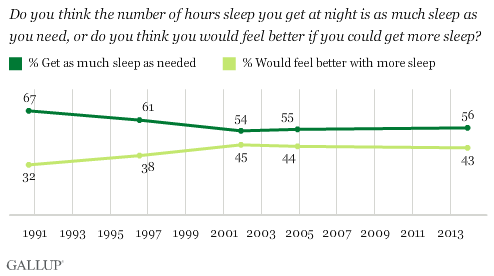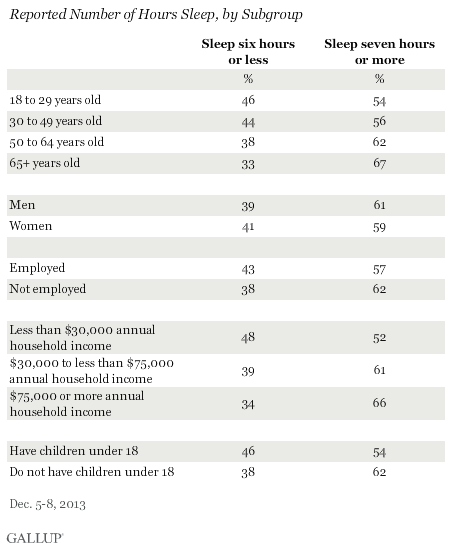
Information on the treatment of Snoring, Sleep Apnea, Excessive Daytime Sleepiness and other Sleep Disorders by Houston, Texas Neurologist and Sleep Medicine Specialist Jerald Simmons M.D. If you suffer from sleep problems, Dr. Simmons and his staff at CSMA can provide relief with three state of the art sleep medicine centers in the greater Houston area.

Monday, December 23, 2013
New Gallup Poll Data Suggests 40% of Americans Don't Get Enough Sleep
A new Gallup poll shows that 40% of Americans get less than seven hours of sleep per night- a figure largely unchanged from the 1990s and 2000s.
The poll is based on telephone interviews conducted Dec. 5-8, 2013, with a random sample of 1,031 adults, aged 18 and older, living in all 50 U.S. states and the District of Columbia.
56% of Americans say they get as much sleep as needed, while 43% say they would feel better if they got more sleep. The percentage who say they get sufficient sleep has been in the mid-50% range since 2001, but was much higher in 1990. Americans aged 65 and older report getting the most sleep, with 67% getting seven or more hours per night. Each younger age group gets less sleep, down to 54% of 18- to 29-year-olds who report getting seven or more hours. Nearly half of 18- to 29-year-olds get less than the recommended amount of sleep.
Medical studies have related a lack of sleep to health problems and cognitive impairment: experts typically recommend seven to nine hours sleep for adults.
The indirect cost of sleep disorders is estimated at 41 billion dollars per year from lost productivity, 17 to 27 billion dollars per year from motor vehicle accidents, 7 billion dollars per year in work-related accidents and 2 to 4 billion dollars per year in home and public accidents (Stoller MK Clin Ther 1994:16 873-897). These figures do not even take into account the added morbidity caused by the physiologic impact from sleep disorders. Unfortunately, Sleep, a process which consumes about one third of our life and which has a spectrum of abnormalities which can hinder our daily living, has received so little attention in our medical education system.
For more information on the importance of proper sleep hygiene, The Societal Sleep Problem and sleep related illness please visit the HoustonSleep.Net.
References:
Gallup.com: In U.S., 40% Get Less Than Recommended Amount of Sleep
Methodology, full question results and trend data
Subscribe to:
Post Comments (Atom)



No comments:
Post a Comment